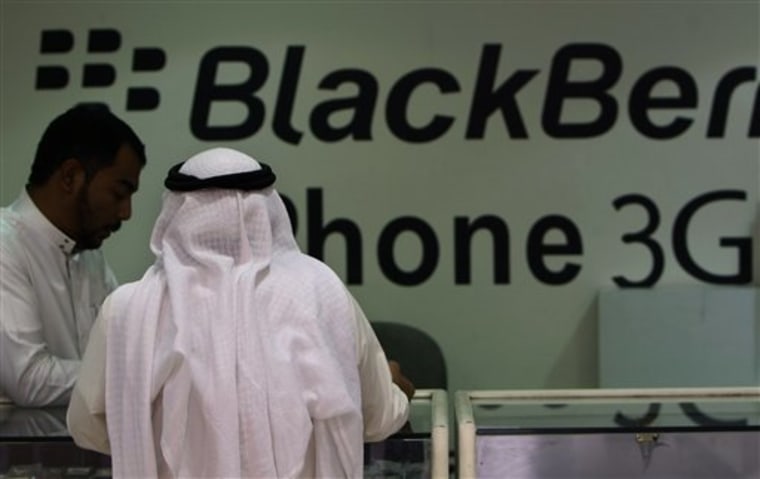Saudi Arabia's telecom regulator is giving mobile operators more time to finalize a deal to allow BlackBerry messaging to continue, staving off a ban of the service in the Arab world's largest economy.
Officials have told The Associated Press that device maker Research in Motion Ltd. has reached a preliminary agreement with Saudi regulators that would allow the government some access to users' data, and that authorities were examining how such a system might be implemented.
They say the plan involves placing a BlackBerry server inside Saudi Arabia, which already has strong controls on the Internet to block morally offensive and political content and maintains strict controls on freedom of expression.
Authorities say they are concerned about security, though critics contend that Saudi Arabia and some other countries mulling tougher BlackBerry rules are also motivated by a desire to monitor users' speech and political activity.
The oil-rich kingdom's Communications and Information Technology Commission said in a statement late Saturday that telecom companies now have 48 hours ending Monday to test a system that would allow them to avert a ban.
"Considering the efforts made by mobile phone service providers toward meeting CITC's organizational requirements and fulfilling license conditions, they were given an additional grace period of 48 hours, which ends on Monday, in order to test the proposed solutions," the regulator said in a brief statement. No details were provided.
RIM has declined to comment on the state of negotiations. Saudi Arabia's three mobile operators couldn't be reached.
A deal that allows Saudi officials to access user data in the conservative Islamic country could set a new precedent for how technology companies and governments interact around the world.
A number of countries say they see BlackBerry devices as a security threat because encrypted information sent on them is difficult, if not impossible, for local governments to monitor when it doesn't pass through domestic servers.
Among them is Saudi Arabia's neighbor, the United Arab Emirates, which has said it plans to block BlackBerry e-mail, Web browsing and messaging services starting in October. India, Indonesia and Lebanon have also raised concerns about the devices.
Simon Simonian, a telecom industry analyst at Dubai-based investment bank Shuaa Capital, said the way Saudi Arabia solves its impasse with RIM could provide a model for other countries eyeing BlackBerry crackdowns.
"Everybody will be closely monitoring the developments in Saudi Arabia to see if it could set an example and become a template for resolution in the UAE or other countries," Simonian said.
Bahrain's foreign minister, meanwhile, said his country has no plans to follow its Persian Gulf neighbors in banning some BlackBerry services, because the security concerns do not outweigh the technological benefits.
Sheik Khaled bin Ahmed Al Khalifa told The Associated Press that the devices raise legitimate security concerns, but he said Bahrain has decided that banning some of the phones' features is "not a way of dealing with it."
